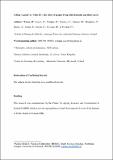| dc.contributor.author | Casey, Dympna | |
| dc.contributor.author | Lynch, Una | |
| dc.contributor.author | Murphy, Kathleen | |
| dc.contributor.author | Cooney, Adeline | |
| dc.contributor.author | Gannon, Mary | |
| dc.contributor.author | Houghton, Catherine | |
| dc.contributor.author | Hunter, Andrew | |
| dc.contributor.author | Jordan, Fionnuala | |
| dc.contributor.author | Smyth, Siobhan | |
| dc.contributor.author | Felzman, Heike | |
| dc.contributor.author | Meskell, Pauline | |
| dc.date.accessioned | 2019-05-21T14:53:48Z | |
| dc.date.available | 2019-05-21T14:53:48Z | |
| dc.date.issued | 2019-02-25 | |
| dc.identifier.citation | Casey, Dympna, Lynch, Una, Murphy, Kathleen, Cooney, Adeline, Gannon, Mary, Houghton, Catherine, Hunter, Andrew, Jordan, Fionnuala, Smyth, Siobhan, Felzman, Heike, Meskell, Pauline. (2019). Telling a ‘good or white lie’: The views of people living with dementia and their carers. Dementia, doi: 10.1177/1471301219831525 | en_IE |
| dc.identifier.issn | 1741-2684 | |
| dc.identifier.uri | http://hdl.handle.net/10379/15185 | |
| dc.description.abstract | Objective: A common symptom of cognitive decline in people living with dementia, or people
with memory problems, the cause of which has not yet been diagnosed, is the person repeatedly
asking for loved ones who are deceased or making statements that are incorrect. Carers are then
faced with a dilemma, do they avoid and distract or ‘correct’ the person and tell the ‘truth’, or tell
a lie. This paper explores the concept of lying from the perspective of people living with dementia
in the community and their informal/unpaid carers.
Methods: A descriptive qualitative study utilising focus groups to collect the data was conducted.
Three focus group’s with a purposive sample of people with memory problems (n ¼ 14) and three
focus group’s with informal/unpaid carers (n ¼ 18) were undertaken. Qualitative content analysis
was used to analyse the data.
Results: All participants considered that blatant lying with the intention to deceive and do harm
is not acceptable. However, telling a ‘good lie’ or ‘white lie’ to alleviate distress was in certain
circumstances considered acceptable. The intention behind the ‘lie’ in their view had to be to do
good, and the informal/unpaid carer telling the lie had to really ‘know the person’ and be
cognisant of family preferences. Some informal/unpaid carers acknowledged that it may be
acceptable for health care professionals to tell a ‘good lie’ or ‘small lie’ in certain circumstances.
However, health professionals need to ‘know the person’ and need to consider informal/family
caregivers’ wishes.
Conclusion: Lying was only considered acceptable in the context of knowing the person and
when done with the intention not to harm or deceive, undertaken with empathy, and only for the
purpose of mitigating the person living with dementia’s distress. | en_IE |
| dc.description.sponsorship | The author(s) disclosed receipt of the following financial support for the research, authorship, and/or
publication of this article: This research was commissioned by the Centre for Ageing Research and
Development in Ireland (CARDI) which is now the Ageing Research and Development Division of the
Institute of Public Health in Ireland (IPH). | en_IE |
| dc.format | application/pdf | en_IE |
| dc.language.iso | en | en_IE |
| dc.publisher | SAGE Publications | en_IE |
| dc.relation.ispartof | Dementia | en |
| dc.rights | Attribution-NonCommercial-NoDerivs 3.0 Ireland | |
| dc.rights.uri | https://creativecommons.org/licenses/by-nc-nd/3.0/ie/ | |
| dc.subject | people living with dementia | en_IE |
| dc.subject | therapeutic lying | en_IE |
| dc.subject | informal/unpaid carers | en_IE |
| dc.subject | informal carers of people living with dementia | en_IE |
| dc.subject | qualitative research | en_IE |
| dc.title | Telling a ‘good or white lie’: The views of people living with dementia and their carers | en_IE |
| dc.type | Article | en_IE |
| dc.date.updated | 2019-05-21T10:51:30Z | |
| dc.identifier.doi | 10.1177/1471301219831525 | |
| dc.local.publishedsource | https://doi.org/10.1177/1471301219831525 | en_IE |
| dc.description.peer-reviewed | peer-reviewed | |
| dc.contributor.funder | Centre for Ageing Research and Development in Ireland (CARDI) | en_IE |
| dc.contributor.funder | Ageing Research and Development Division, Institute of Public Health in Ireland (IPH) | en_IE |
| dc.internal.rssid | 16017823 | |
| dc.local.contact | Dympna Casey, School Of Nursing & Midwifery, Aras Moyola, Nui Galway, Galway. 3652 Email: dympna.casey@nuigalway.ie | |
| dc.local.copyrightchecked | Yes | |
| dc.local.version | ACCEPTED | |
| nui.item.downloads | 1367 | |


